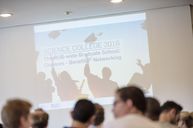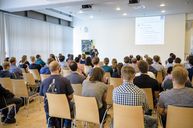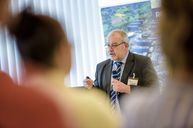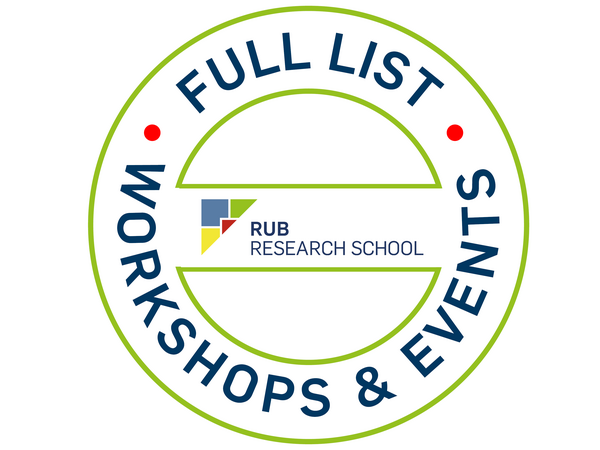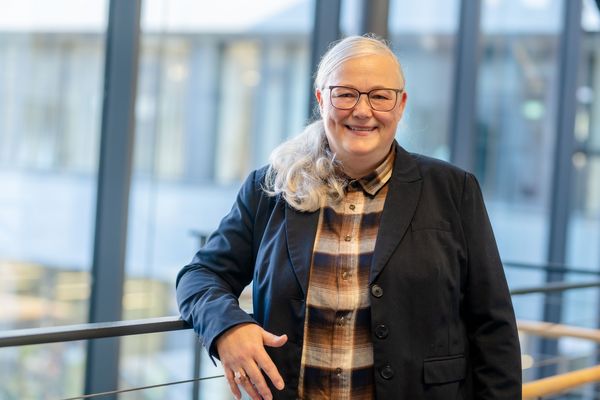- Sie sind hier:
- Startseite
- Promovierende
- Forschungsmanagement Skills: Workshops & Veranstaltungen
- Science College
Science College
Fachübergreifende Themen in der Forschung diskutieren
Das Science College ist eine eintägige interdisziplinäre Veranstaltung der Research School. Sie ermöglicht den fachübergreifenden Austausch zwischen Doktorand*innen und vermittelt ein Verständnis für Forschung über Disziplinen hinweg.
Führende Expert*innen und Forscher*innen der RUB diskutieren aktuelle, fachübergreifende Themen im interdisziplinären Dialog mit den Teilnehmer*innen, die für alle Forschungsbereiche relevant sind. In den interaktiven Teilen des Programms erweitern die Teilnehmer*innen ihr Wissen über Forschung und reflektieren ihr eigenes wissenschaftliches Selbsterverständnis.
Fürs RS Zertifikat: Wenn Sie an dem Zertifikat der Research School interessiert sind, ist eine Teilnahme am Science College einmal während der Promotion notwendig.
Hinweis: Das Science College findet auf Englisch statt. Daher finden Sie alle Programminformationen auf Englisch.
Science College 2020: How is research perceived by the public and why is this important for me as a researcher? Friday 11, December 2020 - Online
Science College explored the roles and responsibilities of researchers in and for society by discussing what we know about “the public” and what we know about self-understandings, motivations and experiences of researchers who make their research public. Experts and researchers of RUB offered a look behind the scenes by sharing their knowledge and experiences on attitudes and expectations of non-expert and layperson audiences towards publicly discussed research and strategies, attitudes and experiences researchers react with to the public perception of research. In the afternoon the participants started working on a public profile for expert and/ or non-expert audiences by drafting first contents for a potential individual homepage. You can find the programme here.
Science College 2019: Open Science - How Open and Transparent Should Research be? Thursday, 27 June 2019
Science College addressed the recent discussions about Open Science. Participants gained first insights into the topic itself and in research practices like Open Access, Open Data and Design Thinking. Experts and researchers shared their knowledge and experiences and summed up the most important pros and cons for doing research openly. Participants had the opportunity to reflect Open Science for their own research and could start thinking about if (or if not) Open Science might affect it. You can find the programme here.
Science College 2018: Building Trust in Research(ers), Tuesday, 03 July 2018
Together with invited experts the participants discussed if stakeholders outside academia do trust in research, if researchers can or should trust the public and why all this is important for those who are doing research. The invited experts shared their knowledge, experiences and strategies how to transfer knowledge between research and other communities. They helped to understand which expectations, understandings or misunderstandings and which concerns might lead to trusting each other or not. They explained what the public believes about research and what reliable researchers should keep in mind when relating their research to a broader public. Workshops in the afternoon provided strategies, knowledge and competencies to define own understandings of being trustworthy as a researcher and how to convincingly communicate this to others. You can find the programme here.
Science College 2017: Taking Your Research to a Broader Public, Thursday, 29 June 2017
At Science College experts of different fields shared their perspectives & experiences on knowledge transfer and engaging the public with research. Kristin Raabe and Dr. Ulrike Brandt-Bohne (both NaWik) emphasized that society and media wants to engage with research and the story behind it and on the responsibility as researcher to engage in public discussions. The perspective of researchers presented by Dr. Sarah Jahn and Prof Christof Paar elaborated on the need to take up another perspective and deal with different expectations as well as the impact on research reputation and career by engaging research with the public. In the following panel discussion, the experts discussed experiences and strategies to communicate research publicly and encouraged the participants to find their individual approach. Within four parallel workshops held by highly renowned experts (Kristin Raabe, Dr. Ulrike Brandt-Bohne, Ulrich Grünewald, Dr. Tobias Maier) from the Nationale Institut für Wissenschaftskommunikation in the afternoon participants trained their skills and strategies on how to communicate the key message of their research to laypersons and how to successfully interact with non-expert audience. You can find the programme here.
Science College 2016: The RUB-Wide Graduate School: Chances-Benefits-Networking, 07 July 2016
Science College focused on the role of RUB Research School as an interdisciplinary graduate school for doctoral researchers at Ruhr-Universität Bochum. The programme revolved around Research School’s aims as a graduate school and its offers to doctoral researchers as a complementary training facility. It has been hosted by the current speaker Prof. Dr. Wilhelm Löwenstein and as a special guest Prof. Dr. Nils Metzler-Nolte – former speaker of RUB Research School. Participants had been invited to take part in the discussion about aims and offers, to give their feedback and define further demands. You can find the programme here.
Science College 2015: Interdisciplinarity, 11 June 2015
The participants discussed with invited experts and experienced researchers of RUB about questions and factors of interdisciplinary research. Why is interdisciplinarity important for modern research and how does it affect the work of researchers. The fellows participated in table discussion groups and a plenary session on the interdisciplinarity of research, especially of doctoral research. You can find the programme here.
Science College 2014: Relevance of Research, 01 July 2014
In various panels and group exercises participants had the opportunity to discuss across all disciplines what makes research relevant. Starting with a more general view on research as a whole the afternoon sessions focused on defining factors for and by the participants to describe the relevance of their own research. A case study and panel discussion raised questions like “Who defines relevance of research and how?”, “Inhowfar do funding lines, media, society, scientific community etc. have an impact on choosing a field of research?”, “Which research is relevant for society?” or “Scientific relevance vs. personal relevance”. In 5 parallel table discussions in the afternoon hosted by doctoral researchers the participants discussed issues raised in the morning session. Comments, conclusions, recommendations or questions have finally been summed up in a plenary discussion. You can find the programme here.
Science College 2013: Responsibility in Research, 12 June 2013
Science College highlighted the challenges in mastering responsibilities in research, especially in doctoral research. Lectures and discussions focused on aspects of good scientific practice and research integrity and put a special emphasis on researchers’ self-responsibilities to conduct research. The day started with 4 keynote lectures giving different thematic impulses to the overall topic. They were followed by 5 parallel table discussions in the afternoon, hosted by doctoral researchers to discuss their issues raised in the keynote lectures and to describe their own topics of interest. Comments, conclusions, recommendation or questions had been summed up later in a plenary discussion. You can find the programme here.
Science College 2012: Brain - Machine - Society: Exploring LEARNING, 02 July 2012
During the day a special focus has been put on current scientific findings, debates and concepts on learning, enclosing a number of related issues from education, philosophy, neurosciences, psychology and history. In keynote lectures invited experts from different research fields presented and discussed their disciplinary understanding about the foundations of learning, dimensions of learning and limits of learning to facilitate a revised understanding of learning. You can find the programme here.
Science College 2011: My doctorate … and I, 18 October 2011
Invited experts set and presented recent issues defining and profiling the doctorate like the academic, social and political framework, the status of doctoral researchers in research institutions and society, the balance of institutional and personal autonomy. The event encouraged the participants to discuss and reflect their own experience and status as early career researchers in their peer-network and with the invited experts. The day started with 3 keynote lectures on future developments in doctoral qualification, the scientific, societal and political frameworks for doing a doctorate and the relevance of international mobility. The keynotes have been followed by eight parallel workshops in which the participants discussed with themselves and with the invited experts relevant aspects of doctoral qualification. You can find the programme here.
Science College 2010: Half-Life of Knowledge, 11 October 2010
Participants had the opportunity to discuss with invited guest speakers relevant issues about the half-life of research knowledge, like the relevance of scientific knowledge in- and outside of the scientific community, quantitative indicators and quality in research, ethics and responsibility in research, additional communication means like Open Access or Science Journalism, the availability and distribution of knowledge and its relevance to society. You can find the programme here.
Science College 2009: Simulation and Modelling: Chances and Limitations of Analyses and Prognoses, 19 June 2009
The event offered inspiring examples from different disciplines to learn how to apply simulations and models, how to solve problems of abstractness and uncertainty, how to handle potentials for creativity and virtuality. In addition, the programme opened an interdisciplinary perspective by discussing with the invited experts what simulation and modelling mean in the different research fields. You can find the programme here.
Science College 2008: Independent Research - How Much Academic Freedom is Needed to Become a Successful Researcher?, 11-12 June 2008
The event started with a keynote lecture by the German Nobel Prize winner in Physics 2007, Prof. Peter Grünberg, from the Forschungszentrum Jülich (FZJ) about how he became an independent researcher and why he believes independence is an important success factor in research. Prof. Andreas Bartels from the University of Bonn covered the topic of independence of research from a broader perspective by defining independence as being free from any political, social, religious or economical duties. In order to delve into different aspects of independence in science, five workshops were organized by doctoral researchers, each supported by an experienced researcher. In the workshops the participants debated with their hosts about many different topics such as career planning, obstacles in science, work-life-balance, differences in the disciplines and the impact of mobility. The second day focused on the questions of institutional and financial conditions for independent research and the responsibility of scientists. It started with two keynote lectures of renowned researchers on gaining research independence and conducting research responsibly and independent. They also highlighted the importance of being independent in research for making successful research. You can find the programme here.
Science College 2007: Interdisciplinary Dialog or Clash of Cultures?, 2-3 July 2007
The aim of this event was to discuss interdisciplinarity in research from different research perspectives. Participants actively discussed the topic of interdisciplinary research with the main speaker Prof. Dr. Dr. Vollmer (University of Braunschweig) who explored the topic of scientific cultures and shared his knowledge about how to start an interdisciplinary dialogue. Experienced researchers from RUB gave insights into their research fields and demonstrated by their talks how to communicate research beyond disciplinary boundaries. In self-organised workshops the participants tried to identify the key messages of the given talks to reflect and understand the possibilities but also the challenges of an interdisciplinary understanding of research. You can find the programme here.
- Forschungsbezogene Kompetenzen: Workshops & Veranstaltungen
- Karrierevorbereitung: Workshops & Veranstaltungen
- Forschungsmanagement Skills: Workshops & Veranstaltungen
- Liste aller Workshops & Veranstaltungen
- Förderprogramme zur Internationalisierung
- Beratung & Ombudsperson
- Promovierenden-Datenbank
- Welcome Hour
- Newsletter



